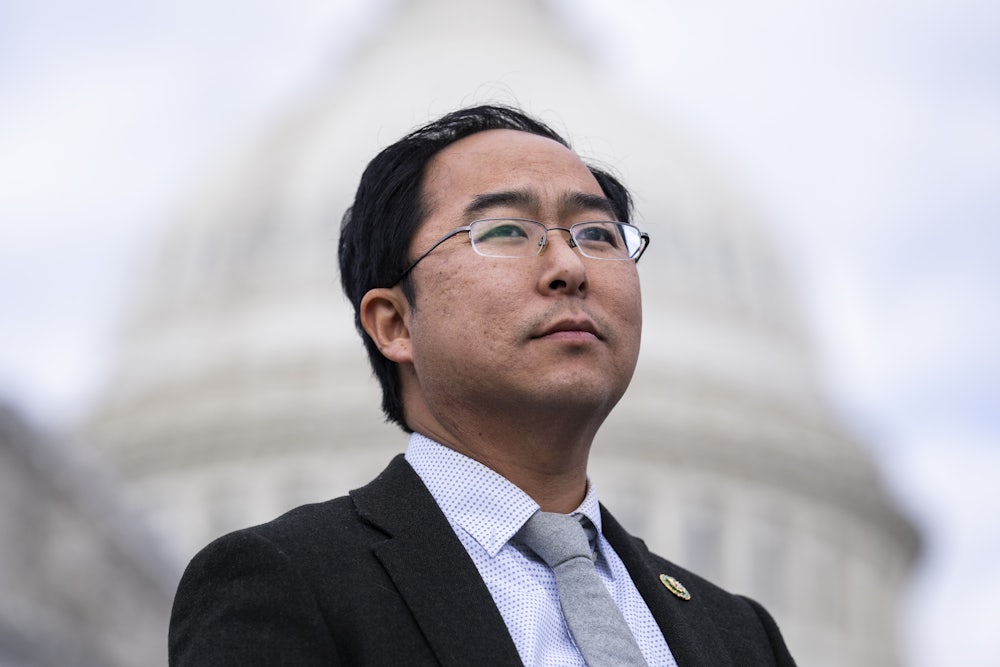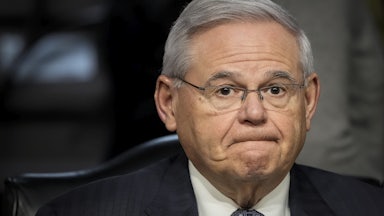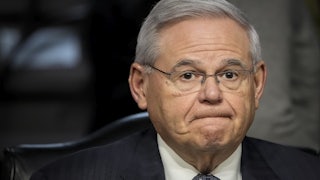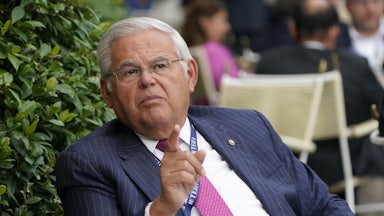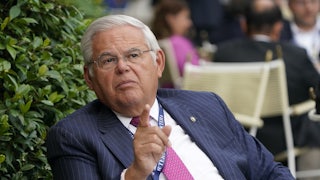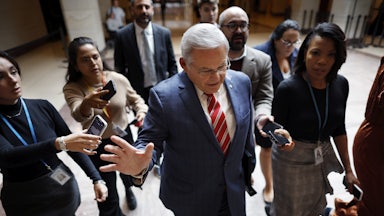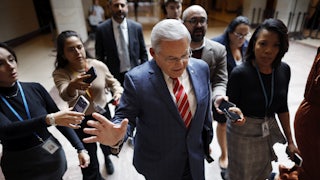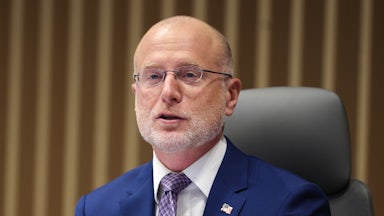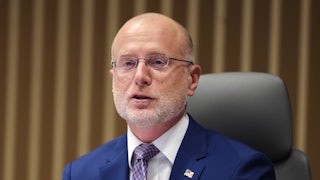Representative Andy Kim wasn’t planning on running for Senate. But when the Justice Department filed charges against New Jersey Senator Bob Menendez last month, the third-term congressman decided to launch a primary challenge against the longtime Democratic senator.
Less than a month after Kim threw his hat in the ring, on Thursday, federal prosecutors filed a superseding charge against Menendez and his wife, alleging that he conspired to act as a foreign agent on behalf of Egypt. (Menendez, formerly the chair of the Senate Foreign Relations Committee, has stepped down while he is under investigation.) Menendez has defiantly maintained his innocence, saying on Thursday that the extra charge is “an attempt to wear someone down,” and that he would “not succumb to this tactic.” Meanwhile, several Democrats have called on Menendez to step down in light of the charges against him.
On Friday, I asked Kim for his thoughts about the charges against Menendez, particularly given Kim’s background working for the State Department and National Security Council. “As someone who worked in national security, I can think of few things more serious than that kind of questioning,” Kim told me.
We also discussed the ongoing chaos that has engulfed the House of Representatives since Speaker Kevin McCarthy was ousted from his post last week, and Kim’s thoughts on how Congress should respond to the conflict in Israel. Kim is one of roughly 400 representatives supporting a bipartisan resolution condemning the terrorist attack by Hamas in Israel, which is unable to pass while the House lacks a speaker.
“We need to make sure that we are focusing on this, and that we remain engaged and informed, and that we can inform the American people about why we’re doing it,” Kim said.
This interview has been condensed and lightly edited for clarity.
I just wanted to start by talking a bit about the news that came out yesterday. Federal prosecutors slapped another charge against Senator Menendez and his wife, alleging that they conspired to have the senator act as a foreign agent of Egypt. Given your background in foreign policy, I was wondering if you could explain why you think these charges are so significant, and what they mean for you as you are now seeking this position in the Senate.
I had a lot of concerns about the senator’s behavior just coming out from the first indictment. The allegation that he used his position as the chairman of the Senate Foreign Relations Committee potentially to provide personal information about personnel at an embassy, and things like that, were deeply alarming. As you mentioned, I’m somebody who worked at the State Department. I’ve worked in embassies abroad. I’ve worked at the Pentagon, the National Security Council. We swear under oath in that job to defend the Constitution and be willing to sometimes put ourselves in harm’s way to be able to protect the country. And we believe that everyone in that space in national security should have that same approach. Questioning the chairman of the Senate Foreign Relations Committee, the idea that perhaps he was not always acting with 100 percent of the interests of the United States.… As someone who worked in national security, I can think of few things more serious than that kind of questioning.
Look, he has every bit as much of a right for due process, and his ability to engage that in the legal process, but he is still currently a member of the Senate Foreign Relations Committee, albeit not the chair. But he is also privy to classified information, having discussions as we’ve had with the Biden administration this week about very sensitive actions that the United States is or could be taking when it comes to different wars, different efforts that are out there. I don’t feel confident [about his ability to serve], given this. I don’t feel like the public trust is there for him to be able to continue to do this job, especially when it comes to that much sensitive material.
Thus far, only half of the Democratic caucus in the Senate have called on him to step down and no Republican senators have done so. Why do you think there’s hesitation among senators to move to expel him or even just to call on him to resign?
That’s a question for them. I don’t know what’s going through their minds and the dynamics inside the Senate. But at least from my standpoint, as someone who worked in national security and is continuing to work on these issues in the United States House, that is not behavior that I think we should tolerate in the House or the Senate. So I certainly hope that we can move forward. But given the fact that he has said multiple times that he’s not going to step down—in fact, he again, after the superseding indictment, said that he would not be stepping down—I just feel like that’s why it is that I decided to step up there and run against him, to make sure that the people in New Jersey have a choice. And I hope that they see the choice in front of them and they see how critical it is for us to restore integrity to our politics … when we’re living through a period with the least amount of trust in government in modern American history. We absolutely need to do everything we can right now to restore that sense of integrity.
I also want to ask you about the situation that we are currently seeing in the House. We don’t have a speaker, and there is no clear resolution in sight. Would you support some kind of bipartisan pact to keep Congress running, whether it’s empowering Speaker Pro Tempore Patrick McHenry to keep the lights on or choosing a consensus speaker—or have you not even thought about any of that yet?
I’d be open to those discussions. I’d have to get a sense of what that would entail, both in terms of who would potentially be the speaker and what the priorities would be—and especially how we would move forward on some of those most pressing issues right now, like keeping our government open, continuing to defend our nation, as well as support our allies in Israel and Ukraine and elsewhere. That would need to be a part of that conversation. There is very little trust right now after earlier this year. We struck a deal with then-Speaker Kevin McCarthy, and we passed that deal regarding the debt ceiling crisis, and laying out our sense of the budget going forward. We made that deal. We voted on it in huge numbers in a bipartisan way. And then Speaker McCarthy and the Republican caucus broke that. So there’s very little trust. We’re open to those conversations, but we don’t want to be in a situation where we see another broken promise, a broken deal. And we need to get a sense of why it would be different this time around.
But right now it’s just total chaos here. I mean, I’ve been here all week at the United States Capitol. We’ve done zero votes. We have no ability to move forward any legislation. We have this very important resolution, bipartisan resolution condemning Hamas’s terrorist attacks and supporting our partners in Israel. We can’t even bring that up for a vote. We can’t even have the kind of official business of the House that we need to at such a critical time. And countries around the world, our partners and our adversaries, are seeing the United States paralyzed at this point legislatively. It’s just sending all the wrong signals globally.
I’m glad you brought that up. I was going to ask you how you think the chaos in the House is affecting the reputation of the U.S. on a global stage, particularly in a time of such international crisis. If you’re our global partners, or our enemies, what’s your reaction to what’s happening in the House right now?
I remember, earlier this year, I got a phone call from an official from a different country, a partner country. And they did ask me, “Is America—are you all really going to default on your debt?” This was before the deal, and the best I could say [was], “Look, I’m going to do everything I can not to, because it would be catastrophic. But I’m not positive.” And the person on the other end, I just remember they kind of just sighed and laughed a little bit, because they found it so absurd.
And what I heard from that person, as well as others, is this kind of singular question that’s often being asked in these other countries. They ask, “Is America a reliable partner?” That’s how they phrase it. And right now, they’re asking the question, but they have an answer to that, which is “No.” They don’t believe that America is a reliable partner. In fact, they call it American whiplash. We join the Paris climate agreement, we leave the Paris climate agreement, we join the Paris climate agreement. They don’t know what value the American handshake has anymore.
And so that’s deeply problematic. It’s problematic because it gives our adversaries a sense of weakness on our end, that we’re unable to make decisions. We’re unable to hold to it, and we’re unable to stay steady and steadfast with the actions that we agree to do. And it sends really terrible signals to our partners, as well as countries that we’re trying to strengthen our partnership with. Because they don’t know, when push comes to shove, are we going to be there?
We see this very much when it comes to Ukraine, for instance—a chance for us to stand up for democracy, stand up for people who were invaded by another country. If we are unable to continue that kind of support, that’s going to send shock waves to all these other situations, global situations where people are wondering, “Would America be there for us? Would America be there in our time of need?” That question of, “Is America a reliable country?” is something that we need to look at ourselves in the mirror about, and figure out how we fix it—realizing that our global leadership is not measured just through military might and our GDP, but it’s also measured through our capacity to … have a functioning democracy that is able to make decisions, able to lead, able to respond to just the extraordinary amount of chaos and conflict that’s erupting globally.
You mentioned the situation in Israel earlier. Assuming that a speaker is chosen in the near future, how do you think Congress should be responding to this conflict?
Right out of the gate, we need to move forward with that bipartisan resolution and speak in a bipartisan, bicameral way, to show that we don’t stand for the brutality of the terrorist attack, that we stand with Israel, and that we stand with this effort to make sure that we’re protecting civilians and especially children throughout the region. The fight back against Hamas has done so much to terrorize not just Israeli people but also the Palestinian people, and [we must] try to figure out how do we build out that broader coalition across the Middle East and across the world that wants to see that kind of progress being made.
It will be difficult, and it’ll require likely additional resources from the United States. And we’ve already had discussions with the Biden administration, about a future supplemental that we can push forward on right now. I’m on the Armed Services Committee, and we’re making sure that we can move forward on the kind of commitments we’ve had when it comes to Iron Dome, especially interceptors and munitions and other types of weaponry that is needed for their defense right now.
But again, we should be reaching out to other countries. I’m glad to see Secretary of State Antony Blinken out there, not just in Israel but throughout the region and talking to our partners and allies around the world. Those are the kinds of engagements that need to happen. But the other thing I’ll just say is that we need to recognize that we have to be able to sustain this level of attention and engagement. We have a very short attention span as a country. And I’ve worked in national security and politics long enough to see headlines come and go, crises come and go—or at least the attention on those crises come and go, where oftentimes the crises continue and persist for quite some time.
What we’re seeing unfolding right now, this will take a long time. We don’t know exactly what comes next, but I guarantee that is not something that will be resolved quickly. And it’s going to fall off the headlines as other crises emerge, other developments emerge elsewhere in the world and here at home. Congress needs to face that, needs to stay focused, needs to not just chase the headlines and have a short attention deficit disorder problem. We need to make sure that we are focusing on this, and that we remain engaged and informed, and that we can inform the American people about why we’re doing it.
I think, so often, we fail to be human about the challenges that we face globally. And we don’t talk to the American people. I just did a town hall yesterday where I talked about these issues in Israel and tried to explain why it is that we’re doing this.… We’ve got to talk to the American people and explain this, otherwise the disinformation and the misinformation and the propaganda that’s out there starts to fill that vacuum, and makes it harder for us to explain why America’s global leadership is so important, now more than ever.
If I could bring it back to domestic politics, how would you characterize the mood among House Democrats right now, as you watch this chaos within the Republican Conference? Is there any sense of schadenfreude that you have, or any [sentiment] like, “Well, this never happened to us when we had the same margin of majority”? Or are you mostly just looking at it and shaking your heads?
There’s a somberness on the Hill right now. I don’t find people are thinking about this with anything other than just sadness that it’s come to this. I’ve been in Congress now for four and a half years. In that short amount of time, I’ve participated in 50 percent of all presidential impeachment votes in this nation’s history. I was sworn in during the longest government shutdown in our nation’s history. I was there in the Capitol on the day of January 6, and watched my colleagues cast votes against the Electoral College. I recently saw the removal of a speaker of the House for the first time.
It’s sad to see such an esteemed institution like the United States House of Representatives brought to this level of dysfunction. To see people, my colleagues, putting their own personal fame and ambitions ahead of what’s best for the country, at a time when American families are really struggling and there’s a lot of worry about all the chaos and the conflict and the violence that surrounds us—it’s really sad. I’ve been here all week, ready to go; I’m ready to vote. And to realize that we don’t have a capacity to do anything is just deeply sad. Just really frustrating.
You famously put a Star Wars Lego set on your wedding registry, which paid off years later when you completed the set with your sons. So I was curious, are you still a fan of Star Wars? And if so, what is your favorite Star Wars movie or show?
I live and breathe Star Wars. In fact, the day that I announced my run for Senate was my kid’s eighth birthday, and he had received a TIE bomber Lego set that I was building with him when I had to ask his permission if I could step away and write and send the tweet in which I announced my candidacy for the United States Senate. Which was a pretty surreal experience, and clearly shows this is not something I ever had planned or thought of before.
But it’s been wonderful. I really love being able to share it with the kids. I’ve always been such a big fan, and to just see it through their eyes, to see how much they fall in love with it as well. I mean, certainly it’s probably helped by the fact that I put up posters all over our house and then kind of forced them, in some ways, to grow up with it. But when I posted a picture of my kids building the TIE bomber, Mark Hamill responded on Twitter. My son and I were just over the moon. The idea that Luke Skywalker was wishing my kid a happy birthday just meant a lot.
I’m an Empire Strikes Back fan. That was always the one. I mean, it also was the fact that my family only allowed me to buy one VHS when I was younger, so I had Empire, and I was just probably watching it like every day when I got home from school, so that definitely kind of feeds into it. But I’m a fan of the whole thing.
